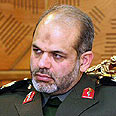
Iranian DM: We'll respond with force to Israeli attack
Moments after Islamic Republic's parliament approves president's nominee for defense minister, Ahmad Vahidi, accused of involvement in 1994 bombing of Jewish center in Argentina, new minister says Every move from the Zionist entity against Iran, will be met with powerful response'. Meanwhile, Official says willing to talk with world powers, but not about nuclear program
Iran's new Defense Minister Ahmad Vahidi, accused of involvement in the 1994 bombing of a Jewish cultural center in Argentina, used his first moments in office to send a clear message to Israel that any attack on the Islamic Republic's nuclear facilities would yield a powerful response from Iran.
Vahidi is one of five prominent Iranians sought by Argentina in the bombing, which killed 85 people. He was the commander of a special unit of Iran's Revolutionary Guard known as the Quds Force at the time of the attack.
Iran's conservative-dominated parliament approved Vahidi's appointment on Thursday.
Following the approval of his appointment, Vahidi addressed the possibility that Israel may attack his nation's nuclear facilities: "Every move from the Zionist entity against Iran, will be met with a harsh and powerful response from Iran."
He said his great success in the Thursday's Majlis vote "attests to the anti-Zionist spirit of the Iranian parliament and people".

Vahidi speaking before parliament (Photo: AP)
In response to objections voiced by heads of the Argentinean Jewish community, as well as Israeli Defense Minister Ehud Barak, to his appointment. "The Zionist regime's propaganda always has a reverse effect on the Iranian regime," he said.
Regarding the West's suspicion of his involvement in the Buenos Aires bombing, he said, "Everyone knows that what was published was under pressure from the Zionist lobby."
Meanwhile, the Iranian parliament rejected in the vote the nominees for the energy, education, as well as welfare and social security ministries, two of them women.
But Marzieh Vahid Dastjerdi was approved as health minister, the Islamic Republic's first female minister since the 1979 Islamic revolution.
Iran won't discuss nuclear work with powers
On the nuclear front, a senior Iranian official was quoted by a state-run television website on Thursday as suggesting any talks with world powers would not address the Islamic Republic's atomic energy program.
The comments by Ali Asghar Soltanieh, Iran's envoy to the International Atomic Energy Agency, were published a day after world powers pressed Iran to meet them for talks on the nuclear dispute before a UN General Assembly meeting this month.
"It is wrong to think that possible talks with (the six world powers) would be about Iran's nuclear program," Soltanieh was quoted as saying by the website of al-Alam, a state-run television station.
"Iran's nuclear issue can only be examined at the International Atomic Energy Agency," he said.
Al-Alam, an Arabic-language service, said Soltanieh made the comments in an interview late on Wednesday.
Soltanieh said Tehran "was always ready to cooperate" with the UN nuclear watchdog agency to remove any doubts about its nuclear program, which Tehran says is for peaceful power generation but which the West suspects is aimed at making bombs.
Iran, the world's fifth-largest oil exporter, has repeatedly rejected demands to halt or freeze expansion of uranium enrichment, which can have both civilian and military purposes.
Citing Iran's chief nuclear negotiator Saeed Jalili, Soltanieh said "international cooperation, energy security and global disarmament" were among international and regional topics that could be raised in discussions with the world powers.
Jalili was quoted by state television on Tuesday as saying Iran was ready to talk to world powers and that Tehran had prepared "an updated nuclear proposal".
On Wednesday, Germany hosted a meeting of senior officials of Russia, China, the United States, France and Britain to discuss Iran's nuclear program.
Volker Stanzel, political director in the German Foreign Ministry, said after the meeting:
"With reference to Dr Jalili's statement this week that Iran is ready to resume talks, I expect Iran to respond to the offer of talks (made) in April by agreeing to meet before (the) UNGA (UN General Assembly)," Stanzel said.
A senior European official said the powers wanted such a meeting within about two weeks. There was disappointment that there had been no movement on the issue since April, he said.
The UN General Assembly meeting is on Sept. 23-25.










